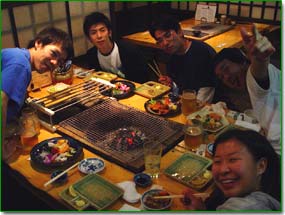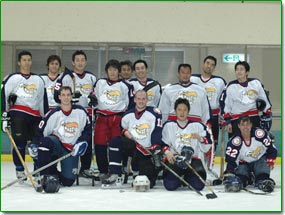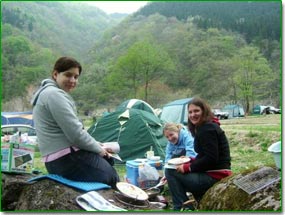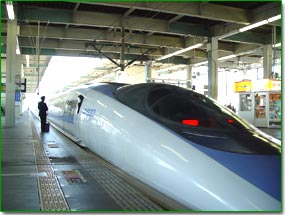Finally, what is your new, everyday life going to be like here in Nagoya? One word: FUN! The number of renewing JETs here shows that life in Nagoya is pretty sweet. Nagoya is Japan's 4th (some say 3rd) largest city with a population of over 2 million. Nagoya has a pace of life that is less frantic than that of Tokyo or Osaka, but it offers an extensive variety of entertainment possibilities (from Japanese to Western to just bizarre), shops, and restaurants. You cannot fail to have fun here.
What to do for fun?
 1. Eat - Food itself and the act of eating it in general is a huge part of Japanese Culture. When you leave Japan someday, chances are many of your
best memories will incorporate food into them somewhere. If you're worried, the selection of international foods is quite large: Indian, Chinese,
Korean, Thai, Italian, French, Brazilian, Mexican. Of course, there are some Japanese restaurants here too... Costs range from maybe ¥600/meal to
maybe ¥100,000/meal if you're crazy enough to pay that much. You'll find plenty of familiar franchises in Nagoya too (Pizza Hut, Starbucks, Subway,
etc.) For vegetarians, eating out in Japan can be a hassle sometimes — the Japanese don't really understand the whole vegetarian thing
— but there are a number of other vegetarians in the office to help you out. You may want to bring some recipes from home if you enjoy cooking.
1. Eat - Food itself and the act of eating it in general is a huge part of Japanese Culture. When you leave Japan someday, chances are many of your
best memories will incorporate food into them somewhere. If you're worried, the selection of international foods is quite large: Indian, Chinese,
Korean, Thai, Italian, French, Brazilian, Mexican. Of course, there are some Japanese restaurants here too... Costs range from maybe ¥600/meal to
maybe ¥100,000/meal if you're crazy enough to pay that much. You'll find plenty of familiar franchises in Nagoya too (Pizza Hut, Starbucks, Subway,
etc.) For vegetarians, eating out in Japan can be a hassle sometimes — the Japanese don't really understand the whole vegetarian thing
— but there are a number of other vegetarians in the office to help you out. You may want to bring some recipes from home if you enjoy cooking.
2. Drink - Drinking alcohol seems to be a national pastime, and there are plenty of bars and drinking places around. Some places feature "all you can drink" for ¥1500 - ¥2000 for two hours. In the summer, Beer Gardens are all the rage and a blast. During the rest of the year, a good Izakaya (Japanese-style bar) should fill you up nicely. Just look for the red paper lanterns, and you can be sure a party awaits inside.
3. Dance - Yes, we have nightclubs! You can stay out all night dancing, and then catch a taxi or the first subway home in the morning. Most places have cover charges, but the charge usually includes some free drinks.
4. Be Merry - Nagoya has karaoke places, pachinko parlors, and bowling alleys in abundance; these are mainstays of Japanese after-work culture. Most popular Western movies make it to Japan (about 6 months late), and are shown in English with Japanese subtitles. However, be warned; movie tickets cost about ¥1800 in Japan. Video rental shops are everywhere, but selection isn't always the best. Also, a variety of big-name musicians make it to Japan each year. Some recent visitors were Aerosmith, Destiny's Child, Metallica, and the Godfather of Soul himself, Mr. James Brown. There are also classical concerts as well as the occasional theatre performance. In fact, many recent JETs have been a part of a local foreigner theatre troupe that puts on a couple shows every year.
5. Be Cultural - You can take classes on anything and everything. The most popular classes available are generally classes in Japanese language, martial arts, tea ceremony, flower arranging, Japanese cooking, and pottery making. There are also museums, and No and Kabuki theaters to see. Professional Sumo comes to Nagoya every July for the Nagoya tournament, and it is certainly a sight to behold and highly recommended.
 6. Be Sporty - Gyms, pools, rugby, football, soccer, volleyball, ultimate Frisbee, even ice hockey. Basically everything. Whatever your area of
interest, it's in Nagoya! So, don't forget to pack some sporting equipment.
6. Be Sporty - Gyms, pools, rugby, football, soccer, volleyball, ultimate Frisbee, even ice hockey. Basically everything. Whatever your area of
interest, it's in Nagoya! So, don't forget to pack some sporting equipment.
7. Go Shopping - You can buy most anything here! We have Body Shop, Williams-Sonoma, J. Crew, L.L. Bean, Eddie Bauer, Northface, and the Gap, just to name a few. Almost everyone in Nagoya — and that's over 2 million people — crams into the town center on Sundays to go shopping, so you may want to do your shopping on another day of the week.
8. Go Computing - Internet-Manga bars can be found near most big subway stations or other areas of entertainment in the city, and are quite inexpensive as well. Just ¥200 can buy you an hour of internet time with all-you-can-drink soda or coffee. Otherwise broadband at home is ultra-competitive here, so the prices are very reasonable and the speed is generally faster than what you can currently get in your home country (Japan is consistantly ranked near the top of the world's fastest countries in terms of internet speed).
Another source of computer access will be your school: All schools in Nagoya have a few PCs and printers in the teacher's room. But these are shared by the whole staff, so access is sometimes limited, and the speed isn't nearly what you can get at home.
If you have a laptop or are thinking about it, definitely go for it before you come. If you buy a PC in Japan, it will come with a Japanese keyboard and a Japanese OS (e.g., Japanese Windows rather than English Windows). If you have any computing questions, just ask one of the current JETs for more information. Otherwise you can find professional computer help here in English, but like anywhere, it will cost you.
 9. Go Hiking - There are good day hikes within an hour of Nagoya by train. A bit further away are the magnificent Japan Alps (sorry for
sounding like a guidebook), which are great for a trekking weekend.
9. Go Hiking - There are good day hikes within an hour of Nagoya by train. A bit further away are the magnificent Japan Alps (sorry for
sounding like a guidebook), which are great for a trekking weekend.
10. Go Skiing or snowboarding - In winter, of course. It can be a little expensive and sometimes crowded, but the slopes are good in the Land of the Mountains. Most of us go skiing or boarding at least once a year; a couple of us go a lot more than that. Skiwear is not particularly expensive in Japan, but if you are attached to your stuff, you may want to bring it.
11. Go Tripping - Some of us head out of town on weekends, exploring different areas of Japan. When we have more time, Asia beckons. Nagoya is one of Japan's transportation hubs, so all of Japan — and much of Asia — is easily accessible within a few hours.
12. Go to a Festival - Japanese people LOVE festivals. They have one for just about every occasion one can think of. There is the Nagoya Festival, the Naked Man Festival, the Fertility Festival, the Hamamatsu Kite Festival, and many others. A few of those are must-sees while you are here.
Who to do it with?
The Nagoya AETs are generally a close group, and from the start you will have a ready-made circle of friends with whom to share your experiences
and your occasional bouts of culture shock. And, of course, with a little effort, you'll make lots of Japanese friends here too.
Where to do it?
 In Nagoya:
In Nagoya:
Transport within the city is pretty simple. The subways get crowded at rush hour, but they're nothing compared to the infamous Tokyo lines. Most
public trains run until about 12-12:30 AM. After that, you'll have to take a different mode of transportation, like taxi or bike. It is highly
recommended that you purchase a bike soon after arriving in Nagoya. The city is very bike-accessible, and cycling around will help you
familiarize yourself with the city. Also, you'll stay healthy and save a lot of money!
Outside Nagoya:
Transport outside of the city is easy too. Public transportation in and around Nagoya is excellent, as in all of Japan. Planes, trains,
automobiles, buses — even hovercrafts — you name it, Japan has it. And since we have it, you should definitely use it.
A Few Final Thoughts
Here are two final pre-departure tips. They may not seem important now, but they might when you get to Japan.
First: Airline Miles. You WILL do a lot of traveling during your time on JET, starting with your long departure flight to Tokyo. Make sure that you are enrolled in the frequent flyer program of the airline on which you fly. Rack up those miles now, plan wisely, and you should be able to fly free on at least one vacation later on in your esteemed JET career.
Second: Vaccinations. If you are planning to travel around Asia while on JET (and most people do), you should consider getting vaccinations in your home country. Vaccinations are outrageously expensive here, and are not covered under our medical insurance. Additionally, Malaria tablets aren't sold in Japan, so if you will travel to a country where those are needed, you may want to bring a supply with you.
Finally, if you have some pressing concern that has not been covered, then by all means, contact us and ask. Surprising experiences are part of the fun of living in a different country, but if there are some surprises you'd rather be prepared for, we'll help you as best we can!